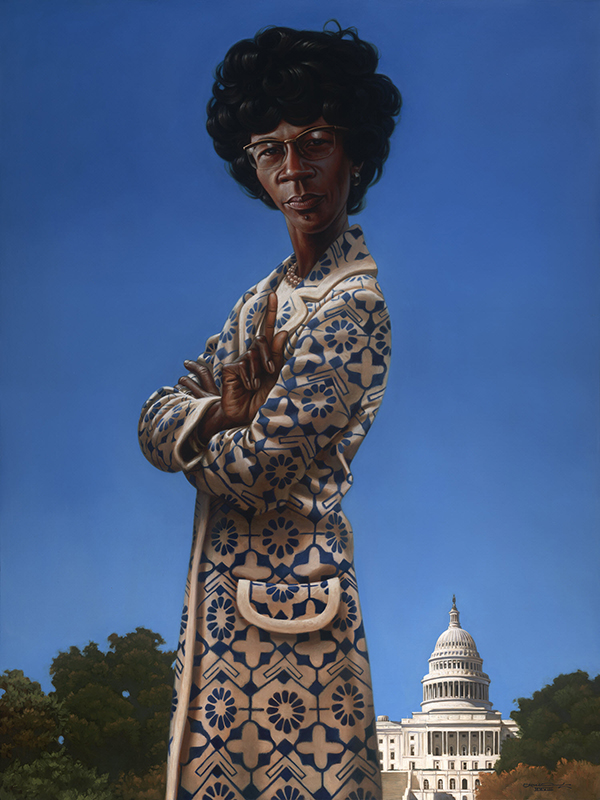Humanist Women in History: Shirley Chisholm "Unbought and Unbossed"
March is Women’s History Month in the United States, the UK, and Australia. As luck would have it, there are five Wednesdays in March, so in commemoration we bring you the five-part series: “Humanist Women in History.” We begin with Shirley Chisholm, the first African-American woman elected to the US Congress.
“If they don’t give you a seat at the table, bring a folding chair.”
—Shirley Chisholm, advising longtime friend Donna Brazile

Portrait of Chisholm by Kadir Nelson in the Collection of the US House of Representatives
Trailblazer Shirley Chisholm was born Shirley Anita St. Hill on November 30, 1924, in Brooklyn, New York, the daughter of a Barbados-born maid and a Guyanese laborer. Her parents struggled financially and when Shirley was five, they sent her and two of her three sisters to live with their maternal grandmother in Barbados. Chisholm was eleven when she returned to the United States.
Chisholm graduated from Girls’ High School in Brooklyn in 1942 and enrolled at Brooklyn College to study sociology on a scholarship. During this time she became active in civic affairs, attending city meetings and winning accolades for her debating skills. After graduating in 1946 she entered Columbia University to pursue a master’s in education. In 1949 she married Conrad O. Chisholm, a Jamaican who had immigrated to the United States three years earlier. She received her master’s degree in 1952.
Over the next decade Chisholm ran a number of childcare centers in New York and was a consultant in New York City’s Bureau of Child Welfare, all while remaining active in local politics, pushing for racial equality and volunteering for the NAACP, the League of Women Voters, and other organizations. She served as a New York State Assemblywoman from 1964-1968 and made history as the first African-American woman elected to the US Congress. Without any backing from the Democratic establishment—Chisholm’s slogan was “unbought and unbossed”—she defeated the favored Republican candidate, in part with the vote of women and the Puerto Rican community, which she addressed in Spanish.
In 1971 Chisholm was a founding member of the Congressional Black Caucus, and also helped found the National Women’s Political Caucus with Gloria Steinem, Betty Friedan, and other feminist activists.
In 1972 Chisholm made history again as the first black US presidential candidate from a major party and the first woman to run for the Democratic nomination. Fueled by a desire to break boundaries, in announcing her candidacy she declared:
I am not the candidate of black America, although I am black and proud. I am not the candidate of the women’s movement of this country although I’m a woman and I’m equally proud of that. I am not the candidate of any political bosses or fat cats or special interests. I stand here now without endorsements from any big-name politicians or celebrities or any other kind of prop…I am the candidate of the people of America.
Despite receiving death threats during the campaign and having very little financial backing, Chisholm stayed in the race, garnered 151 delegate votes, and addressed the Democratic convention. Ultimately she lost the nomination to George McGovern.
Chisholm returned to the House and served until 1983, when she retired to care for her second husband, Arthur Hardwick Jr. During her time in Congress she opposed American intervention in Vietnam and increased military spending in general. She advocated for education and maternal health programs, for domestic workers, immigrants, and poor inner-city residents. “In the end anti-black, anti-female, and all forms of discrimination are equivalent to the same thing: anti-humanism,” Chisholm famously said.
She taught at Mount Holyoke College in Massachusetts in the mid-1980s and retired to Florida in 1991. She died on January 1, 2005, at the age of eighty.
In November 2015 Chisholm was posthumously awarded the Presidential Medal of Freedom. “Shirley Chisholm’s example transcends her life,” President Obama remarked at the ceremony. “And when asked how she’d like to be remembered, she had an answer: ‘I’d like them to say that Shirley Chisholm had guts,’” Obama recalled. “And I’m proud to say it: Shirley Chisholm had guts.”
